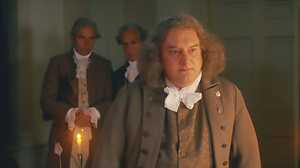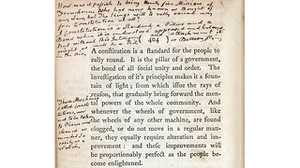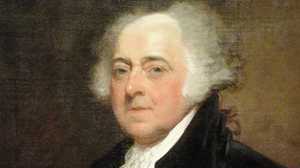Dearest Friend

John and Abigail Adams wrote over a thousand letters to each other. They had plenty to tell one another during the months (sometimes years) that John was away from home helping found a new nation.
From their initial courtship in 1761 through their time as President and First Lady over three decades later, the couple shared insights on their lives and times. John Adams also recorded his thoughts in a diary, which he began keeping at the age of 20.
Read some of the highlighted famous words of a fascinating couple below. Click on the title to read the original letter on the Massachusetts Historical Society Web site.
On Love:
John Adams courts Abigail Smith with a love letter.
Miss Saucy
October 4, 1762
Dear Miss Adorable, I hereby order you to give me as many kisses and as many hours of your company as I shall please to demand, and charge them to my account.
Abigail writes her husband in Philadelphia, where he is a delegate to the First Continental Congress.
I Long For Your Return
October 16, 1774
I dare not express to you at 300 miles how ardently I long for your return. The idea plays about my heart and awakens all the tender sentiments that years have increased and matured.
John writes his wife from Baltimore, where he is attending the Second Continental Congress. Abigail is in the middle of a troubled pregnancy. In July, she will deliver a stillborn daughter.
Hieroglyphics
February 10, 1777
My dear: I am anxious to hear how you do. I have in my mind a source of anxiety, which I have never had before. You know what it is.
Can't you convey to me, in hieroglyphics, which no other person can comprehend, information which will relieve me. Tell me you are as well as can be expected.
Abigail writes to John in France, where he has traveled on a diplomatic mission with their young son, John Quincy.
Lonely Days
December 27, 1778
How lonely are my days? How solitary are my nights? Secluded from all society but my two little boys, and my domestics.
In New York City and newly sworn in as the nation's first vice president, John Adams writes Abigail of his longing for her.
Come, As Soon As Possible
May 14, 1789
I pray you to come, as soon as possible. As to money you must if you can borrow enough to bring you here. If you cannot borrow enough, you must sell horses, oxen, sheep, cows, anything. If no one will take the place, leave it to the birds of the air and the beasts of the field.
On Colonial Life:
Abigail tells John about a frightening dysentery epidemic afflicting Braintree. Their son Tommy, John's brother Elihu, and Abigail's mother all fell ill; of the three, only Tommy survived.
A Mortal Time
September 8, 1775
Such is the distress of the neighborhood that I can scarcely find a well person to assist me in looking after the sick. So mortal a time the oldest man does not remember.
Abigail updates her husband on their Braintree farm. John is in New York, serving as George Washington's vice president.
No Grass This Year
May 5, 1789
Dearest Friend, I procured a load of salt hay for the stock, but the hill is trod down so hard by the cattle that it will provide no grass this year...
In this diary entry, written during a summertime break from his vice presidential duties, Adams savors his life on the Braintree farm.
Refreshing Rain
July 14, 1796
My men are hilling the corn over the road. A soft fine rain is falling as sweetly as I ever saw. It will refresh the gardens, revive the corn, make the fruit grow rapidly.
John Adams, four years removed from the presidency, describes his hopes in his diary.
Tranquility
February 27, 1805
Far removed from all the intrigues, I hope to enjoy more tranquility than has ever before been my lot. I call for my chisels, drills, and wedges to split rocks, and for my wagons to cart seaweed for manure. I mount my horse and ride on the seashore.
On The Revolution:
Seven months before the battles of Lexington and Concord, Abigail writes to John about recent colonial military activity outside their front door in Braintree.
Marching Militia
September 14-16, 1774
About eight o'clock Sunday evening there passed by here about 200 of our men, and marched down to the powder house.
The militia passed without any noise, not a word among them till they came against this house. They asked me if I wanted any powder and I replied not, since it was in good hands.
John describes the First Continental Congress to his mother's cousin, Moses Gill. A week later, colonial militias and Redcoats will clash at Bunker Hill.
Spreading Cancer
June 10, 1775
I am as fond of reconciliation as any man. But the cancer is too far spread to be cured by any thing short of cutting it out entirely.
Abigail describes the fierce battle fought at Bunker Hill. She and her oldest son, John Quincy, see smoke from the fighting from Penn's Hill in Braintree.
Roar of the Cannon
June 18-20, 1775
How many have fallen we know not. The constant roar of the cannon is so distressing that we cannot eat, drink, or sleep. Perhaps the decisive day is come on which the fate of America depends.
Abigail writes to John in Paris after American and French forces defeat the British at Yorktown, Virginia. It will be the war's final major battle.
The Final Battle
December 9, 1781
My dearest friend, America may boast that she has accomplished what no power before her ever did - captured two of their celebrated generals and each with an army of thousands of veteran troops to support them. This event must fill Britain with despondency.
On Politics:
Abigail asks her husband to consider the rights of women.
Remember the Ladies
March 31 - April 5, 1776
In the new code of laws which I suppose it will be necessary for you to make, I desire you would remember the ladies, and be more generous and favorable to them than your ancestors have been. Do not put such unlimited power into the hands of the husbands. Remember, all men would be tyrants if they could.
John responds to Abigail's "remember the ladies" letter.
We Are the Subjects
April 15, 1776
We know better than to repeal our masculine systems. Although they are in full force, you know they are little more than theory. We are obliged to go softly. And in practice you know we are the subjects. We only have the names of masters.
After telling someone who asked that he was not Samuel Adams -- the "famous Adams" -- John laments being anonymous in France, in this diary entry.
A Perfect Cipher
February 11, 1779
I am now a man of whom nobody had ever heard before. A man who did not understand a word of French - awkward in his figure - awkward in his dress - a perfect cipher.
John describes the ramshackle President's house in Philadelphia to Abigail.
A Woeful Pickle
March 22, 1797
The furniture is in the most deplorable condition. The beds are in a woeful pickle. This house has been a scene of the most scandalous drinking and disorder among the servants that I ever heard of.
John considers the future as he writes to Abigail from the new President's House in Washington, D.C., where he has just become the first resident president.
Honest and Wise Men
November 2, 1800
I pray heaven to bestow the best of blessings on this house. May none but honest and wise men ever rule under this roof.







